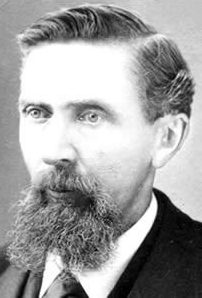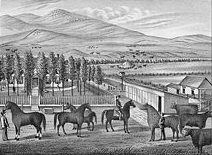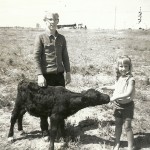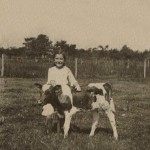butcher
 When Conrad Kohrs, immigrated to the United States at the age of 15, he was seeking his fortune like so many other immigrants were. The year was 1850, and while it is odd these days to think of a 15 year old boy immigrating to America alone now, it wasn’t entirely unheard of then. Kohrs was a native of Denmark, and had planned to head west to make his fortune in gold or silver. Unfortunately, while he had some small success in California and British Columbia, try as he might, the “big strike” always eluded Kohrs.
When Conrad Kohrs, immigrated to the United States at the age of 15, he was seeking his fortune like so many other immigrants were. The year was 1850, and while it is odd these days to think of a 15 year old boy immigrating to America alone now, it wasn’t entirely unheard of then. Kohrs was a native of Denmark, and had planned to head west to make his fortune in gold or silver. Unfortunately, while he had some small success in California and British Columbia, try as he might, the “big strike” always eluded Kohrs.
Kohrs tended to follow the crowd, and in 1862, he joined the latest western gold rush and headed for western Montana, where rich gold deposits had been found at Grasshopper Creek. It might be true that gold was plentiful at Grasshopper Creek, but Kohrs realized that he could make more money mining the miners than mining for gold. Miners need lots of supplies, and the man who was able to supply the needs, was the one who made money. He established a butcher shop in the mining town of Bannack and began to prosper.
His work as a butcher led Kohrs into the cattle business. Cattle were a big commodity, being in relatively short supply in frontier Montana. Much has changed today, and Kohrs had a big part in that. Kohrs traveled around the territory to purchase prime animals. He had several brushes with the highwaymen who plagued the isolated roads of Montana. Determined to stop these murderous bandits, Kohrs joined a group of Virginia City vigilantes, and helped track down and hang the outlaws. By 1864, robberies in the territory had plummeted. Proper or not, vigilante justice, got the point across very well.
Whether he was good at being part of a vigilante group or not, it couldn’t be what made his living. Kohrs began shifting the focus of his meat processing business to the supply side. In 1864, he established a large ranch near the town of Deer Lodge, where he fattened his cattle for market. Kohrs was pretty much the only major rancher in the western region of the territory. This caused his business to boom as Montana grew. As always happens, eventually, competition from cattle driven overland into the territory from Texas began to challenge Kohrs’ monopoly. Nevertheless, he continued to prosper, and remained the largest cattle rancher in Montana for several decades. 
Kohrs entered the political arena in 1885, translating his economic strength into political power. He was elected to the Montana Territorial Legislature. Kohrs and his fellow ranchers had considerable influence over Montana in the years to come, and Kohrs went on to become a state senator in 1902. The big ranchers never had a free hand in Montana, however, because mining interests and farmers always kept the ranchers in check, but it wasn’t for a lack of trying. Kohrs was widely celebrated as one of the greatest pioneers in Montana history. He died on July 23, 1920 at the age of 85 in Helena.
 These days when the fair comes to town, many people think of the rodeo and the petting zoo, but years ago petting zoos didn’t exist. I suppose that might have been because so many people raised their own animals that they didn’t need to go out somewhere to see the farm animals…or at least, many of them didn’t. With the urbanizing of our country, more and more, people don’t get to be around farm animals as much in their everyday lives. I guess that has made us a little nostalgic is some ways. We keep trying to connect to the past in many ways.
These days when the fair comes to town, many people think of the rodeo and the petting zoo, but years ago petting zoos didn’t exist. I suppose that might have been because so many people raised their own animals that they didn’t need to go out somewhere to see the farm animals…or at least, many of them didn’t. With the urbanizing of our country, more and more, people don’t get to be around farm animals as much in their everyday lives. I guess that has made us a little nostalgic is some ways. We keep trying to connect to the past in many ways.
I think most little kids these days have been to a petting zoo, but years ago, the petting zoo was out at the barn after the calving was over, and your admission fee was cleaning out that barn. It just didn’t have quite the same effect on a kid, whether they really liked animals or not. Taking care of animals is a messy job, as any rancher or 4-H student can tell you, and not one you usually associate with little girls. Nevertheless, little girls do like babies, and baby cows are very cute.
Personally, I think I would rather go to the petting zoo. We have raised a cow or two in our time living out in the country, and while the baby is cute when you get it, they are messy, and a lot of work. They grow from babyhood very quickly and then they aren’t so cute. They want their grain and they are willing to rush you to get it. Having a cow…sweet as they can be, step on your foot, or accidently kick you while trying to get to that food or  grain really hurts. Oh, they don’t mean anything by it, but it was not a job I was willing to allow my girls to do,
grain really hurts. Oh, they don’t mean anything by it, but it was not a job I was willing to allow my girls to do,
And the saddest part about raising a cow…the main reason I would rather go to the petting zoo is that once they are grown…they must be butchered. They had been like a pet to us. We had even named them, and then we were expected to eat the meat. It truly got to the point where I could hardly stand to eat it. It’s not that I don’t like beef, because I do. It’s just that I don’t want to know my dinner by name!! No, I’ll buy my beef at the store, and go to a petting zoo, if I really feel the need to get next to nature in that way.

